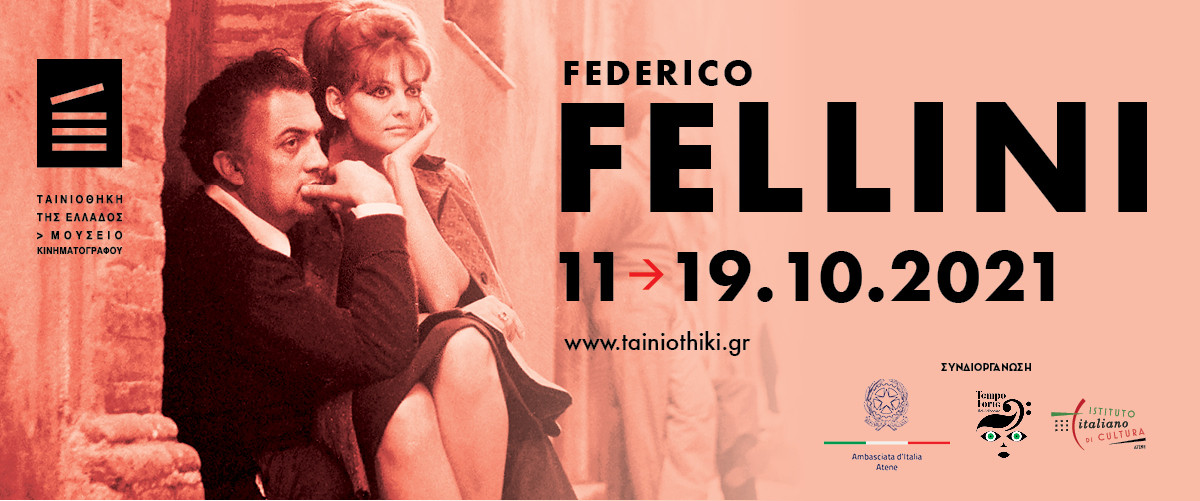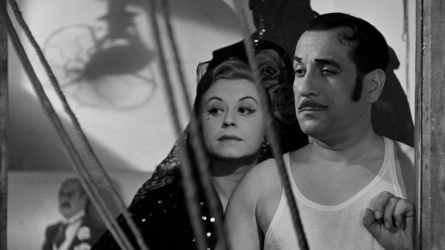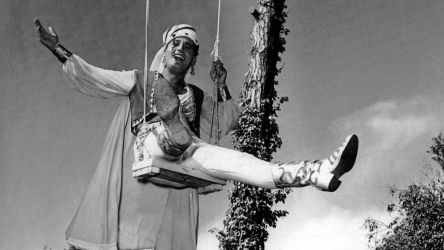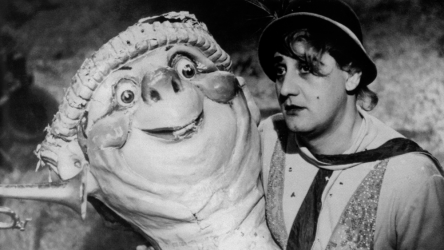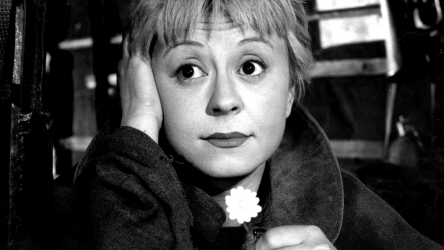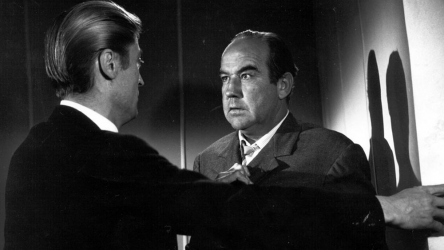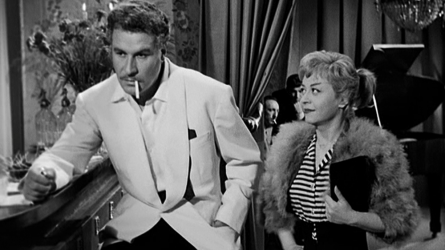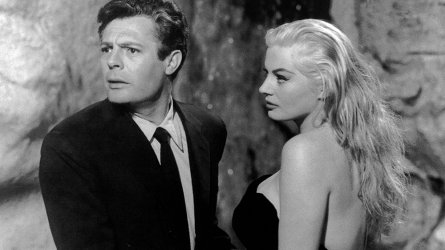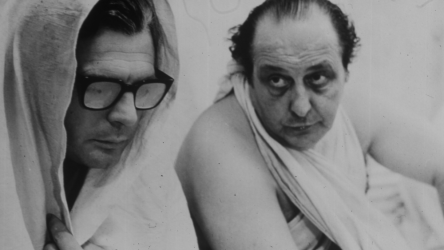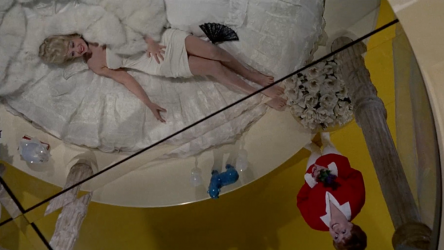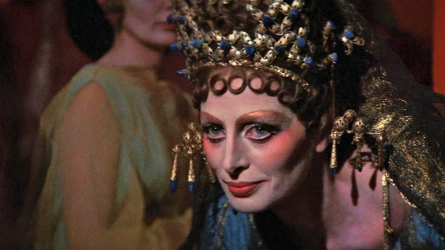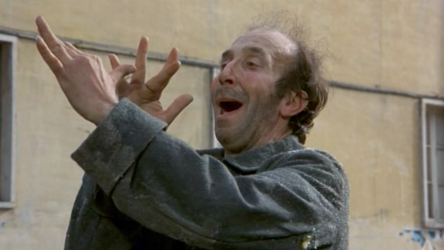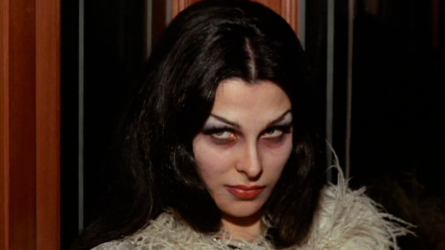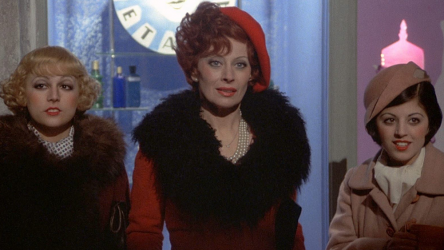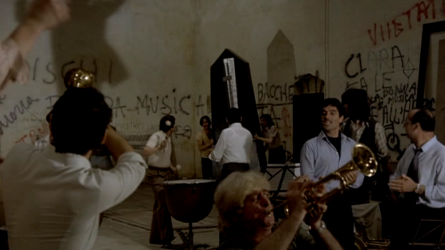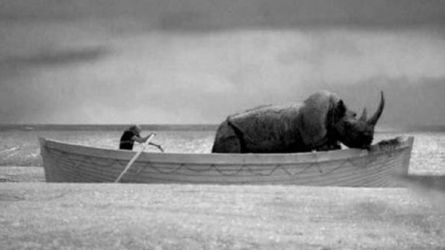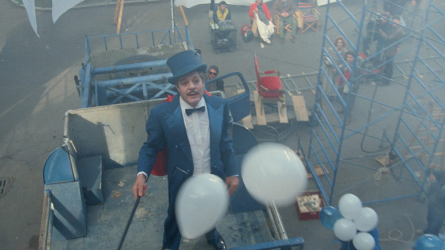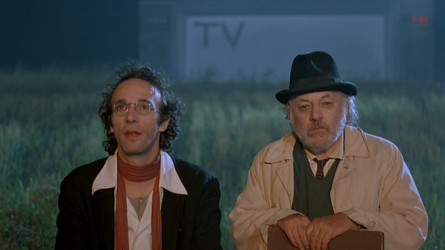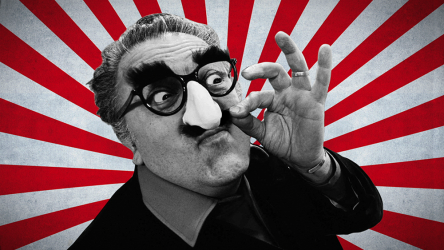From 11 until 19 October 2021
17 Films by the great Italian maestro in celebration of his birth’s centenary.
Federico Fellini. The Greek Film Archive, the Ambasciata d’Italia Atene and the Istituto Italiano di Cultura di Atene, in context of the cultural initiative Tempo Forte and in collaboration with the Istituto Luce Cinecittà, present a comprehensive tribute on the great Italian maestro in celebration of his birth’s centenary.
17 iconic films by Fellini, will be screened–including: 8 ½, La Dolce Vita, La Strada, Nights of Cabiria, Roma, Fellini Satyricon, Amarcord, Orchestra Rehearsal, The White Sheik and I Vitelloni. With the participation of some of the greatest Italian Female stars: Claudia Cardinale, Anna Magnani, Giulietta Masina—and of course, the unforgettable Anita Ekberg with Marcello Mastroianni in the famous Fontata di Trevi scene in La Dolce Vita—the legendary film by the maestro, from which the term “paparazzi” was coined, thanks to the nickname of a scandalmonger photographer, who follows the protagonist like a flee.
The programme is complemented by two documentaries: Fellinopolis and Fantastic Mr Fellini - An Interview with Wes Anderson, which will be screened for the very first time in Greece, at the Film Archive’s online platform: online.tainiothiki.gr. The Fantastic Mr Fellini will also be screened, at the Film Archives main theatre venue.
All films will be screened in digitally restored 2Κ and 4Κ copies with Greek and English subtitles.
The tribute will take place between the 11th and 19th of October at the Greek Film Archive’s large theatre venue; in accordance to the current health protocols in effect. All films will be introduced with a foreword by distinguished guests.
The opening night of the tribute, will take place on Monday 11 October, at the Greek Film Archive—with 8 ½ (1963)—the monumental, self-referential masterpiece by Fellini with Nino Rota’s remarkable music and Marcello Mastroianni’sincarnation of the directors alter ego—bringing to life with vivid expression, the deep agony of the artist. The film will be presented by Maria Komninos, President of the Film Archive and Susanna Schlein, Deputy Chief Counselor of the Italian Embassy in Athens. There will also be a piano musical foreword played by conductor Miltos Logiadis. A limited number of tickets will be available.
As Maria Komninos, president of the Greek Film Archive, notes “with the selection of 17 films, from his co-debut, Variety Lights (1950) to his final film, The Voice of the Moon—cinema lovers, will have the opportunity to delight in Fellini’s unique and oneiric world. In Roma (1972), with his complete orchestration of a series of successive entries, into both real and fantastical locations—the maestro directs an encounter with Anna Magnani, who hurries into her house without stopping to chat with him, yet takes the time to tell him off: “Federico you liar”. This ironic phrase—from the she-wolf symbol of Italian neorealism—marks the self-irony with which Fellini handled himself. Playful, thoughtful and explosively creative, he leads us by the hand from his early chronicles of an impoverished Italy in the process of healing its wounds, to the explosive growth of the ‘60s—a growth that through the bitter gaze of Marcello Mastroianni, signalled a quick succession of impasse’s. Fellini, however, did not do social realism—even though he always had a strong sense of current affairs and climate—with a sideways glance, he instead jostles us into oneiric worlds, forcing us to reflect on human destiny”.
FEDERICO FELLINI (1920-1993)
Federico Fellini, one of the all-time great film directors, was born in Rimini on 20 January 1920. Deeply influential on later generation of filmmakers (including Martin Scorsese), he was more of a people’s director rather than an auteur—in the sense of sophisticated intellectual film creators of cinema at the time. His films are a point of reference, even today. In his unparalleled career, he collaborated with many great artists, including Nino Rota, Pier Paolo Pasolini, Michelangelo Antonioni, Roberto Rossellini, but also the producers of Cinecittà Carlo Ponti and Dino de Laurentiis.
He was awarded four Foreign Language Oscars: in 1956 for La Strada, in 1957 for Nights of Cabiria, in 1963 for 8 ½ and in 1974 for Amarcord—whilst he was also nominated four times for the Best Director Oscar. In 1960, he won the Palm d’Or for La Dolce Vita. In 1993, the American Academy of Motion Picture Arts and Sciences, awarded him an Honorary Oscarin recognition of his cinematic accomplishments spanning his entire career. He died in Rome on 31 October of the same year. On 30 October 1943 he married his muse, Giulietta Masina, with whom they lived together for 50 years, until his death. Fellini reached great heights of success, by drawing exclusive inspiration from his own life and abstaining from any form of finger-wagging. “My films are not philosophical essays” he would say. “To create films and to dream, is one and the same for me. For dreams fascinate, as long as they remain within the realm of the mysterious—if anyone tries to explain them, they immediately become tedious”. Who would have thought that this young man from provincial Italy, was destined to win four Oscars? And all this whilst staying committed to his own truth. “I am always creating an autobiography, even when I'm talking about what I will have for dinner” he once said, with a certain amount of pride, but also with a lot of sincerity on his creative process.
He received his honorary lifetime achievement Oscar, for his contribution to the seventh art, in ’93 from the hands of Sophia Lauren and a clearly moved Marcello Mastroianni. All this took place, in Los Angeles at Dorothy Pavillon, while in the audience sat Giulietta Masina, who could not hold back her tears. “Please, sit down, be comfortable” Fellini had said. “I really did not expect it, or perhaps, I did… But not before another 25 years! I would like to thank all the people who have worked with me, I cannot name them all… Let me only name one name, of an actress who is also my wife—Thank you dearest Giulietta, and please stop crying!”.
His films move between the oneiric and comics, the circus and fantasy—that is in a world governed by magic. All of Fellini's works are aligned with the grammar and syntax of the surreal; already from The White Sheik, his solo debut in 1952. He had a special relationship with his actors.
“I needed an Italian, a friend who would modestly and humbly accept to become my shadow, a friend that would not grow where he is not sown. That’s how I got a hold of Mastroianni—I already knew him; he was incredible: abstract, discrete, likeable, unlikeable, tender, arrogant. Any how. He was perfect” stated Federico Fellini on Mastroianni—protagonist of 8 1/2 and La Dolce Vita, his actor-fetish and alter-ego. For his final film, The Voice of the Moon in 1990, however, Federico chose Paolo Villaggio and Roberto Benigni. Although critical of consumerist society, Fellini did not hesitate to work for television and advertising, which Pasolini hated so much. Of course, always in his own way—dreamlike yet ironic and caustic, as we are so familiar with, from his masterpieces.
8½ AND MASTROIANNI
The production of 8½ was problematic. Fellini as usual did not have something specific in mind. He only wanted to record the thoughts, fantasies and dreams of a man.
Everything was temporary, even the title, which occurred from his six feature films he had made up to that point and three “half” films—that is, films he directed with others. He then went on to forget everything. The vague idea he had in his mind vanished for good. Fellini, horrified, tried to explain to his producer his impasse but was invited to the birthday part of a camera-operator, where the festive environment interrupted the director’s thoughts. Amidst the celebratory chaos, Fellini sat down on a bench and found the solution, he was desperately looking for: the hero of the film would be a film-director, who wants to direct a film, but he forgets what it is about.
Under such circumstances, Mastroianni’s attitude and approach during filming proved to be ideal: without preconceived notions, his mind was a blank canvas—with its sole concern on allowing itself, to be guided by the director.
“On set I always wait; with him though, I wait with greater joy, because when I go to work, it is as if I am going to the theatre—and then I am no longer an actor but a spectator of Fellini”.
In this way Mastroianni, from friend becomes Fellini’s alter-ego, as he perfectly imitates his movements and temperament. In an interview, the actor stated that he owes the truthfulness of his performance, to the long rides they would take together by car. Fellini commented: “I am glad I became his friend, that I made a new friend. There is something magical about this identification with him, to such an extent that sometimes when I look myself in the mirror, it is as if I see his face”.
TICKETS
Ticket: 5€ / Bundle of 5 films: 10€ / Bundle of 10 films: 30€
Online programme: 3€ (single ticket for both documentaries: Fellinopolis and Fantastic Mr Fellini).
Ticket pre-sale: Pre-sale commences on the evening of Wednesday 6 October at the Film Archive’s cashier (during its operating hours).

The tribute to Federico Fellini is organised by the Greek Film Archive and is carried out in the context “Cinephilia in the New Age II” which is funded by the European Union — European Regional Development Fund (Operational Programme ROP ATTIKI of NSRF 2014-2020)
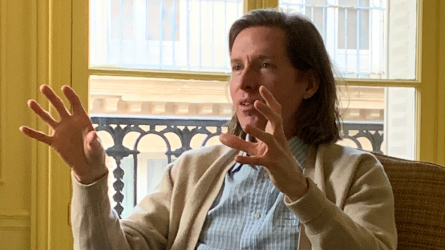
Fantastic Mr Fellini – An Interview with Wes Anderson
Read more ...



